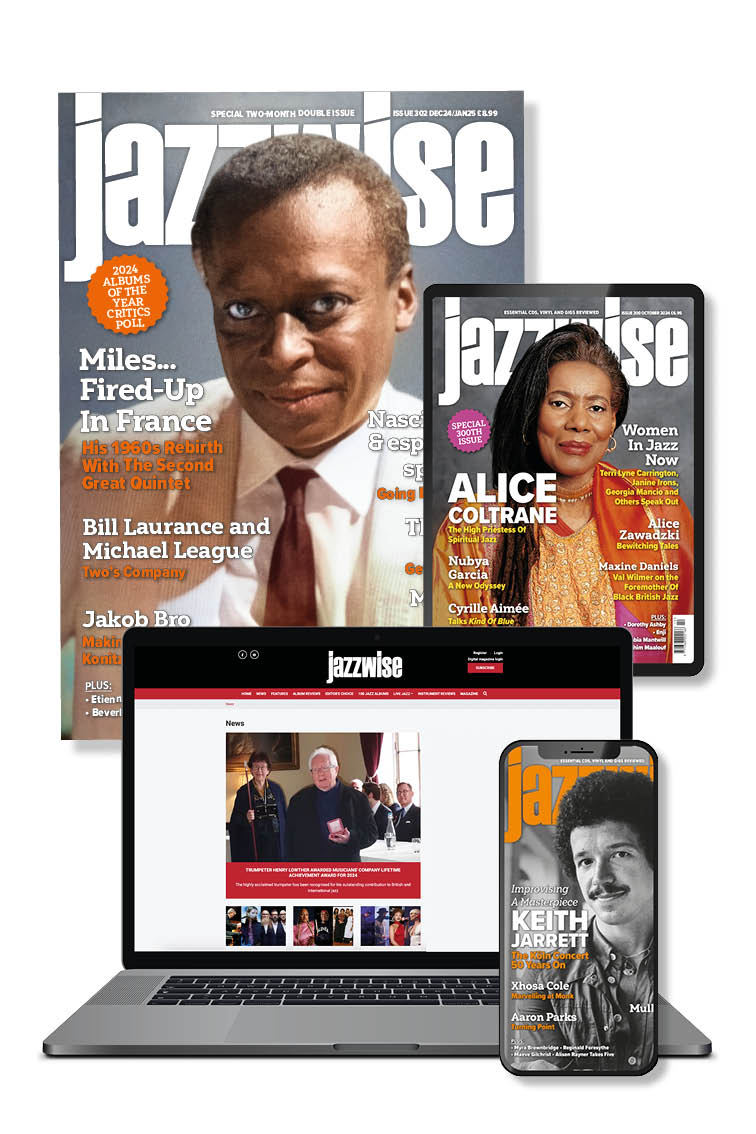Album Interview: Jacob Collier: In My Room
Editor's Choice
Author: Peter Quinn
View record and artist detailsRecord and Artist Details
Musicians: |
Jacob Collier (v, p, g, b, d and more) |
Label: |
Qwest Records |
Magazine Review Date: |
July/2016 |
RecordDate: |
date not stated |
Having received accolades from the likes of Quincy Jones (‘absolutely mind-blowing’), Herbie Hancock, Pat Metheny and Chick Corea, this debut album from the London-based vocalist and multi-instrumentalist Jacob Collier remains that rare thing: a recording that entirely lives up to the extravagant claims made on its creator's behalf. From the engulfing beauty and varicoloured textures of ‘Hideaway’ and the fantastical vocal layerings of ‘Flintstones’ and ‘You And I’, to the almost carol-like tintinnabulations of ‘Hajanga’ and the labyrinthine twists and turns of ‘Don’t You Know’, this is music that explodes with ideas and events. Opening with the metrical shifts and harmonic sophistication of ‘Woke Up Today’, it's a recording in which meticulously-crafted arrangements, a musical imagination of extraordinary richness, and fabulously impressive vocal and instrumental chops coalesce into something powerfully distinctive. Produced, recorded and performed entirely by Collier, and drawing on influences that range from Bach to Bobby McFerrin, no amount of repetition will dim the eclectic brilliance of In My Room.
Jazzwise spoke to Jacob Collier about the album
Does a song like album opener ‘Woke Up Today’ start with a concept of the whole, or do you hear a groove and build on that?
With that song I definitely didn’t go into it knowing how it was going to end up at all. I actually have a whole folder of discarded ‘Woke Up Today’ sections I didn’t use. I kind of followed my ear. I think it's important not to be too precious about songs, otherwise you can be paralysed by them. I work very fast when I do work because it's essentially one train of thought.
At what point did you start to compose?
I don’t think I really ever started, I guess I just found myself doing it. I’d always take a melody and then find a weird harmony that would go with it. When I was about six years old I got Cubase, and that was a really amazing canvas for me. It was basically me and one midi keyboard for quite a number of years. I was constantly experimenting, I learnt how grooves fitted together by making them myself. That language of composing, creating and tracking over myself just got bigger and bigger. I got an SM58 microphone for my 11th birthday, along with Logic recording software, and that was it really.
Tell us about the beautifula cappellaversion of ‘You And I’.
Stevie [Wonder] was a massive part of my upbringing. That song is really special to me because I’ve known it for such a long time, it's just a perfect song. I realised that I was lacking a ballad, and something that was a cappella and slow. I figured that ‘Flintstones’ would be the manic, fast a cappella song, which it is. And there's quite a defined difference between ‘Flintstones’ and ‘You And I’ – ‘Flintstones’ was something I arranged in advance and then recorded, whereas I had absolutely no plan for ‘You And I’ at all. I didn’t touch pen or paper. I literally started singing one note, then another, and another, and I sang something like 3,000 audio files. At the end of it there's something like 58 or 59 voices all together at once – every note in the chord is recorded three or four times and panned to different places. It's this massive gospel sound. It was the first time ever that I’d really done an arrangement which was 100 percent improvised. I started with nothing and then four days later I had this massive arrangement. It was very exciting.
What was it like painting ‘Don’t You Know’ on that vast canvas with Snarky Puppy onFamily Dinner Volume Two?
That was quite extraordinary. I think that was probably the first song I wrote for the album, back in 2013. It was very exciting to think about how to get that to be as beastly as it could be with that many musicians. Those guys are exceptionally gifted accompanists – that's something I really felt. I find it hard to be an accompanist and not get in somebody's way, even with three people playing. They manage to do it with 20 people and never step on each other's toes. They all manage to find something they can do sonically to support things. It was totally amazing, they really transported it to this new place.

Jazzwise Full Club
- Latest print and digital issues
- Digital archive since 1997
- Download tracks from bonus compilation albums throughout the year
- Reviews Database access
From £9.08 / month
Subscribe
Jazzwise Digital Club
- Latest digital issues
- Digital archive since 1997
- Download tracks from bonus compilation albums during the year
- Reviews Database access

